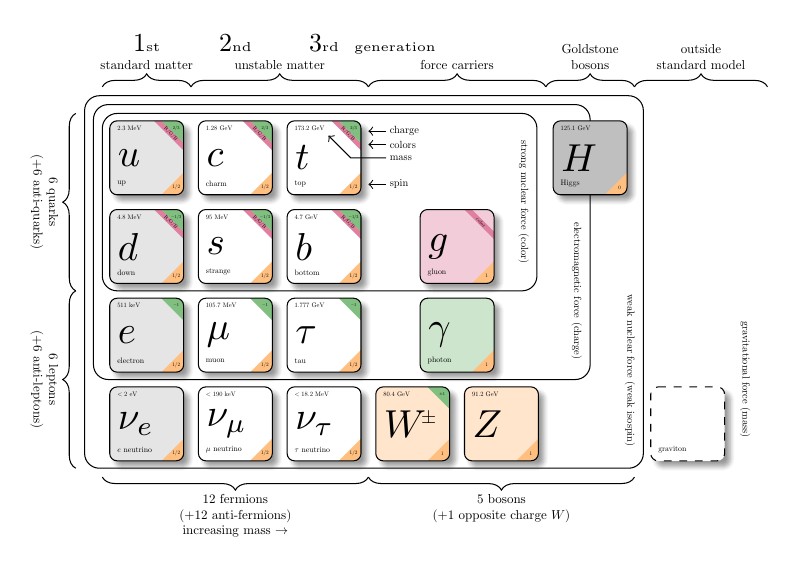
Chart of subatomic particles
Author:
lihj
Last Updated:
9 years ago
License:
Creative Commons CC BY 4.0
Abstract:
Chart of subatomic particles

\begin
Discover why over 25 million people worldwide trust Overleaf with their work.
Chart of subatomic particles

\begin
Discover why over 25 million people worldwide trust Overleaf with their work.
%%%%%%%%%%%%%%%%%%%%%%%%%%%%%%%%%%%%%%%%%%%%%%%%%%%%%%%%%%%%%%%
%
% Welcome to Overleaf --- just edit your LaTeX on the left,
% and we'll compile it for you on the right. If you give
% someone the link to this page, they can edit at the same
% time. See the help menu above for more info. Enjoy!
%
% Note: you can export the pdf to see the result at full
% resolution.
%
%%%%%%%%%%%%%%%%%%%%%%%%%%%%%%%%%%%%%%%%%%%%%%%%%%%%%%%%%%%%%%%
% Standard model of physics
% Author: Carsten Burgard
\documentclass[border=10pt]{standalone}
%%%<
\usepackage{verbatim}
%%%>
\begin{comment}
:Title: Standard model of physics
:Tags: Styles;Decorations;Physics
:Author: Carsten Burgard
:Slug: model-physics
A standard diagram of the current standard model of physics.
In some ways, this was the ultimate, single-diagram user experience
challenge: all of our current understanding of the universe condensed
into a single infographic.
This improved diagram of the standard model of physics was made at
the CERN Webfest 2012 by David Galbraith and Carsten Burgard.
Source:
http://davidgalbraith.org/portfolio/ux-standard-model-of-the-standard-model/
Programmed in TikZ by Carsten Burgard. TikZ styles syntax by Stefan Kottwitz.
\end{comment}
\usepackage{tikz}
\usetikzlibrary{calc,positioning,shadows.blur,decorations.pathreplacing}
\usepackage{etoolbox}
\tikzset{%
brace/.style = { decorate, decoration={brace, amplitude=5pt} },
mbrace/.style = { decorate, decoration={brace, amplitude=5pt, mirror} },
label/.style = { black, midway, scale=0.5, align=center },
toplabel/.style = { label, above=.5em, anchor=south },
leftlabel/.style = { label,rotate=-90,left=.5em,anchor=north },
bottomlabel/.style = { label, below=.5em, anchor=north },
force/.style = { rotate=-90,scale=0.4 },
round/.style = { rounded corners=2mm },
legend/.style = { right,scale=0.4 },
nosep/.style = { inner sep=0pt },
generation/.style = { anchor=base }
}
\newcommand\particle[7][white]{%
\begin{tikzpicture}[x=1cm, y=1cm]
\path[fill=#1,blur shadow={shadow blur steps=5}] (0.1,0) -- (0.9,0)
arc (90:0:1mm) -- (1.0,-0.9) arc (0:-90:1mm) -- (0.1,-1.0)
arc (-90:-180:1mm) -- (0,-0.1) arc(180:90:1mm) -- cycle;
\ifstrempty{#7}{}{\path[fill=purple!50!white]
(0.6,0) --(0.7,0) -- (1.0,-0.3) -- (1.0,-0.4);}
\ifstrempty{#6}{}{\path[fill=green!50!black!50] (0.7,0) -- (0.9,0)
arc (90:0:1mm) -- (1.0,-0.3);}
\ifstrempty{#5}{}{\path[fill=orange!50!white] (1.0,-0.7) -- (1.0,-0.9)
arc (0:-90:1mm) -- (0.7,-1.0);}
\draw[\ifstrempty{#2}{dashed}{black}] (0.1,0) -- (0.9,0)
arc (90:0:1mm) -- (1.0,-0.9) arc (0:-90:1mm) -- (0.1,-1.0)
arc (-90:-180:1mm) -- (0,-0.1) arc(180:90:1mm) -- cycle;
\ifstrempty{#7}{}{\node at(0.825,-0.175) [rotate=-45,scale=0.2] {#7};}
\ifstrempty{#6}{}{\node at(0.9,-0.1) [nosep,scale=0.17] {#6};}
\ifstrempty{#5}{}{\node at(0.9,-0.9) [nosep,scale=0.2] {#5};}
\ifstrempty{#4}{}{\node at(0.1,-0.1) [nosep,anchor=west,scale=0.25]{#4};}
\ifstrempty{#3}{}{\node at(0.1,-0.85) [nosep,anchor=west,scale=0.3] {#3};}
\ifstrempty{#2}{}{\node at(0.1,-0.5) [nosep,anchor=west,scale=1.5] {#2};}
\end{tikzpicture}
}
\begin{document}
\begin{tikzpicture}[x=1.2cm, y=1.2cm]
\draw[round] (-0.5,0.5) rectangle (4.4,-1.5);
\draw[round] (-0.6,0.6) rectangle (5.0,-2.5);
\draw[round] (-0.7,0.7) rectangle (5.6,-3.5);
\node at(0, 0) {\particle[gray!20!white]
{$u$} {up} {$2.3$ MeV}{1/2}{$2/3$}{R/G/B}};
\node at(0,-1) {\particle[gray!20!white]
{$d$} {down} {$4.8$ MeV}{1/2}{$-1/3$}{R/G/B}};
\node at(0,-2) {\particle[gray!20!white]
{$e$} {electron} {$511$ keV}{1/2}{$-1$}{}};
\node at(0,-3) {\particle[gray!20!white]
{$\nu_e$} {$e$ neutrino} {$<2$ eV}{1/2}{}{}};
\node at(1, 0) {\particle
{$c$} {charm} {$1.28$ GeV}{1/2}{$2/3$}{R/G/B}};
\node at(1,-1) {\particle
{$s$} {strange} {$95$ MeV}{1/2}{$-1/3$}{R/G/B}};
\node at(1,-2) {\particle
{$\mu$} {muon} {$105.7$ MeV}{1/2}{$-1$}{}};
\node at(1,-3) {\particle
{$\nu_\mu$} {$\mu$ neutrino} {$<190$ keV}{1/2}{}{}};
\node at(2, 0) {\particle
{$t$} {top} {$173.2$ GeV}{1/2}{$2/3$}{R/G/B}};
\node at(2,-1) {\particle
{$b$} {bottom} {$4.7$ GeV}{1/2}{$-1/3$}{R/G/B}};
\node at(2,-2) {\particle
{$\tau$} {tau} {$1.777$ GeV}{1/2}{$-1$}{}};
\node at(2,-3) {\particle
{$\nu_\tau$} {$\tau$ neutrino} {$<18.2$ MeV}{1/2}{}{}};
\node at(3,-3) {\particle[orange!20!white]
{$W^{\hspace{-.3ex}\scalebox{.5}{$\pm$}}$}
{} {$80.4$ GeV}{1}{$\pm1$}{}};
\node at(4,-3) {\particle[orange!20!white]
{$Z$} {} {$91.2$ GeV}{1}{}{}};
\node at(3.5,-2) {\particle[green!50!black!20]
{$\gamma$} {photon} {}{1}{}{}};
\node at(3.5,-1) {\particle[purple!20!white]
{$g$} {gluon} {}{1}{}{color}};
\node at(5,0) {\particle[gray!50!white]
{$H$} {Higgs} {$125.1$ GeV}{0}{}{}};
\node at(6.1,-3) {\particle
{} {graviton} {}{}{}{}};
\node at(4.25,-0.5) [force] {strong nuclear force (color)};
\node at(4.85,-1.5) [force] {electromagnetic force (charge)};
\node at(5.45,-2.4) [force] {weak nuclear force (weak isospin)};
\node at(6.75,-2.5) [force] {gravitational force (mass)};
\draw [<-] (2.5,0.3) -- (2.7,0.3) node [legend] {charge};
\draw [<-] (2.5,0.15) -- (2.7,0.15) node [legend] {colors};
\draw [<-] (2.05,0.25) -- (2.3,0) -- (2.7,0) node [legend] {mass};
\draw [<-] (2.5,-0.3) -- (2.7,-0.3) node [legend] {spin};
\draw [mbrace] (-0.8,0.5) -- (-0.8,-1.5)
node[leftlabel] {6 quarks\\(+6 anti-quarks)};
\draw [mbrace] (-0.8,-1.5) -- (-0.8,-3.5)
node[leftlabel] {6 leptons\\(+6 anti-leptons)};
\draw [mbrace] (-0.5,-3.6) -- (2.5,-3.6)
node[bottomlabel]
{12 fermions\\(+12 anti-fermions)\\increasing mass $\to$};
\draw [mbrace] (2.5,-3.6) -- (5.5,-3.6)
node[bottomlabel] {5 bosons\\(+1 opposite charge $W$)};
\draw [brace] (-0.5,.8) -- (0.5,.8) node[toplabel] {standard matter};
\draw [brace] (0.5,.8) -- (2.5,.8) node[toplabel] {unstable matter};
\draw [brace] (2.5,.8) -- (4.5,.8) node[toplabel] {force carriers};
\draw [brace] (4.5,.8) -- (5.5,.8) node[toplabel] {Goldstone\\bosons};
\draw [brace] (5.5,.8) -- (7,.8) node[toplabel] {outside\\standard model};
\node at (0,1.2) [generation] {1\tiny st};
\node at (1,1.2) [generation] {2\tiny nd};
\node at (2,1.2) [generation] {3\tiny rd};
\node at (2.8,1.2) [generation] {\tiny generation};
\end{tikzpicture}
\end{document}